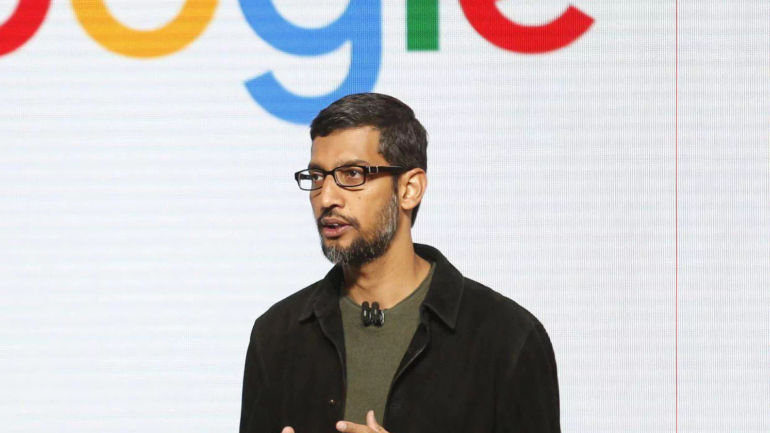
The Future of Search: Insights from Google's CEO

Discover Sundar Pichai's vision for the evolution of search engines in the next decade, focusing on the impact of AI on shaping the future of search technology.
The Beginning of a New Era
Sundar Pichai, CEO of Google and Alphabet, recently had a chat about AI where the main topic was the future of search. He shared his thoughts on the evolution of search and the importance of websites, emphasizing that the key factor is the advancement of technology.
The interviewer inquired if Sundar was surprised by the recent rapid advancement of AI. Sundar, Google's CEO, clarified that Google has been leading in AI and has been building the foundation for it since 2016. He emphasized that the world is just starting the AI era and there are many exciting developments ahead.
Sundar responded:
One of the key tasks I focused on as a CEO was shifting the company's focus towards AI, which I believe will benefit us in the coming decade.
Looking back, I realize that computing power is extremely valuable now. We began developing TPUs and scaling them up in 2016, showing that we have been planning for this for quite some time.
We have always had a good sense of the direction we are heading in. We have been getting the company ready for it, especially with a lot of our research and development focused on artificial intelligence for a while now. This puts us in a strong position for what lies ahead.
Even though we are still in the early stages, I believe people will be amazed by the advancements we will make. It feels like we have only just begun to explore the possibilities.
The Only Thing Different Is The Technology
Sundar was also questioned about the future of search and how it might change. Many publishers and search marketers are worried that AI will completely replace traditional search methods, causing websites to lose traffic and potentially impacting the SEO industry.
It's good to know that Google's CEO believes that people and websites will remain crucial in search in the future, just like they are now.
He mentions that AI has been involved in search for a long time and emphasizes that the web ecosystem still contributes to making search valuable. He also points out that the traditional ten blue links have not been the only search result format for the past 15 years, with Google offering direct answers like featured snippets, videos, top news, and carousels.
This is the question asked:
How are things going to evolve? Like how will people access information in 10 years?
Sundar explains that the main difference is the technology being used. He points out that there is a common misconception that Google has always just shown ten blue links. However, with the emergence of mobile technology, they knew that Google search had to adapt. They have been using AI to provide answers to various questions for almost a decade now, internally referring to it as web answers.
We have always been committed to providing answers to questions to the best of our ability. We understand that people not only seek answers but also value the variety and depth of information available in the world. Striking a balance between providing answers and offering diverse perspectives is important to us, and we believe we have been successful in achieving that balance.
The advancement in technology has changed the way we can provide answers, but our dedication to answering questions remains unchanged. This evolution in search technology has been ongoing for a long time, and we will continue to adapt and improve our methods to better serve our users.
The Evolution of Search
Sundar noticed that search has continuously changed over time. Even though it may look different now compared to fifteen years ago, the main purpose remains the same: finding information on the internet.
He went on to explain that search has evolved over the years. It used to be just text and 10 blue links, maybe 15 years ago. But now, you can find images, videos, and answers to all your questions. These changes have been made to improve the search experience. People have been using Google search for a long time and they like it, engage with it, and trust it.
Search Engines And The Web Go Together
I see it as a natural progression, especially with the advancements in LLMs and AI. With these powerful tools, we are enhancing search capabilities through the Search Generative Experience. This evolution will continue to shape the way we interact with the web.
Sundar was then questioned about political and cultural biases in search engines, specifically regarding accusations that Google's results reflect the liberal views of its employees. When asked how he decides on answers to such questions, Sundar emphasized the importance of information created by people on websites as the most reliable source. He mentioned that despite advancements in Search Generative Experience, the goal remains to direct users to websites for answers.
He explained, "Let's discuss search for a moment. Your question is crucial. We have put in years of effort to ensure that our search results reflect the content available on the web. Our aim is to provide reliable and top-notch information. It has been a long journey navigating through all of this."
We have always maintained a balance in our approach. Sometimes, it's about providing a straightforward answer, like when asked about the population of the United States. Other times, it's about showcasing the variety of opinions available on the web, which is what search does effectively.
Even though we summarize information at the top, we still adhere to these principles. The summary can guide you to different viewpoints that exist, and this is something we consistently do."
SGE Is Different from Chatbot Interaction
When we talk about Search Generative Experience, it's crucial to highlight the aspect of "search" to distinguish it from engaging with a chatbot.
Many articles predict a decrease in search traffic because of SGE, but Sundar explains why this is not actually happening. He highlights the distinction between the search experience and the chatbot experience. This is crucial to understand, especially for those quick to assume that SGE will take over websites. According to Sundar, this is not true as search and chatbots serve different purposes.
I believe there is a difference when interacting with a chatbot compared to other forms of communication. This area is actively being researched, especially in terms of ensuring the chatbot's voice is just right. It is important for us to focus on getting this aspect correct.
Representing a diverse range of views from people worldwide is crucial in this process. There are various aspects to consider, as the challenges with AI models extend beyond just Google and are present in other models as well.
AI Enhances Search (Doesn't Replace It)
Sundar highlights that AI actually enhances existing technologies instead of replacing them. This is a crucial aspect to keep in mind when analyzing the impact of AI on search and SEO.
His explanation of how AI improves but not necessarily replaces:
As a company, the goal is to take advantage of innovations and create successful products and businesses. It has been shown that we are capable of achieving this. What excites me about AI is that it is a versatile technology that can enhance various services like search engines, YouTube, and autonomous vehicles. By integrating AI into the cloud, we can offer these benefits to our customers, which makes me optimistic about the future.
Related: Will AI Replace SEO Specialists?
Takeaways
There was a lot of important information in this interview that provides the most comprehensive picture of what the state of search will look like in the future.
Some of the important points:
AI is not new. It’s been a part of Google for many years now.
Google has provided answers and summaries for years
Websites are important to search
SGE is not a chatbot experience, it’s a search experience
Search and chatbots are two different things
AI improves search (not replaces it)
Watch the interview at the 1 hour 17 minute mark:
Featured Image by Shutterstock/photosince
Editor's P/S:
Sundar Pichai's recent interview on the future of search offers valuable insights into the evolving landscape of information access. While AI is rapidly advancing, it is important to note that it is not intended to replace traditional search methods or websites. Instead, AI enhances the search experience by providing more comprehensive and relevant answers. Google's focus remains on providing users with the best possible information, regardless of the format.
Furthermore, Sundar emphasizes the importance of websites and the web ecosystem in the search process. Publishers and search marketers can be reassured that websites will continue to play a crucial role in providing valuable content and perspectives. The evolution of search is not about replacing websites but about enhancing the ways in which users access and engage with information online. By embracing AI and continuing to create high-quality content, websites can remain relevant and valuable in the years to come.











